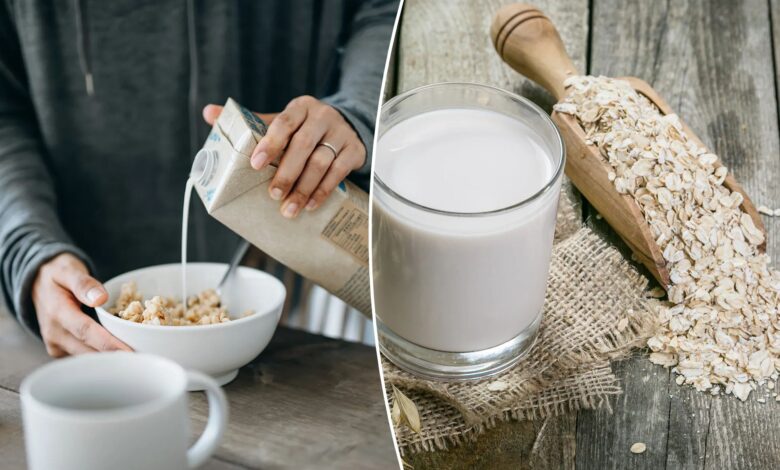Is oat milk bad for you? Some nutritionists don’t love the stuff

Oat milk — it’s the plant-based alternative that not only tastes great with nearly everything, it also happens to be practically unassailable from a nutrition and sustainability standpoint.
Right?
Sorry to your fave, alt-latte lovers, but some experts aren’t buying it — literally.
“While oat milk is delicious, unfortunately it’s not the most nutritious option,” registered dietitian Marissa Meshulam told HuffPost.
The registered dietitian is just one of a handful of nutrition experts the outlet interviewed, asking their feelings about the exceedingly popular beverage.
Concerns ranged from the prevalence of pesticides used for production to the way the drink is made, often using low-priced canola oil to attain the creaminess often not found in other non-dairy drinks like almond or soy milk.
Here, the experts share their less-than-popular opinions.
Oat milk isn’t as healthy as you think
Most oat milks have a lot less protein — 2 to 3 grams per serving — than regular milk, registered dietitian nutritionist Sharon Palmer warned.
“If you use plant milks as a regular part of your diet, like in cereal and smoothies, make sure it’s nutrient-rich,” she advised.
“It should provide a significant source of protein, about seven grams, and about 30% of the vitamin D calcium requirement for the day, which is particularly important for children,” Palmer said.
And then there’s the obvious issue — oats equals carbs.
“Oat milk tends to be higher in calories and carbohydrates compared to other plant-based milks like almond and soy milk,” said registered dietitian nutritionist Tamar Samuels.
“For example, one cup of oat milk has about 100 to 150 calories and 16 to 20 grams of carbohydrates, compared to almond milk, which ranges from 45 from 100 calories per cup, and one gram of carbohydrates,” she said.
“If weight loss is your goal, you might want to consider decreasing high-calorie, low-protein beverages, like large oat milk lattes,” she added. “And if you’re managing high blood sugar, you should also be mindful, since many oat milk products have more added sugar and oils compared to other milk alternatives,” Samuels advised.
“If you suffer from bloating and gas, be especially mindful of ingredients like gums and carrageenan, which may increase these symptoms,” she said.
“From a nutrition standpoint, one cup of oat milk provides the same amount of carbohydrates as a slice of bread, about 15 grams. And then when oats are processed into oat milk, the starches in oats are broken down to simple sugars,” Mashulam noted.
Finally, there’s the oil issue, Mashulam said — check the ingredient labels if you’re looking to avoid a hit of canola oil at the start to your day.
How is oat milk made?
“Oat milk is created by milling whole oats, adding water and enzymes and filtering the liquid from the solids in a centrifuge,” explained registered dietitian nutritionist (RDN) Vicki Shanta Retelny.
“Oat milk must be fortified with calcium, iron, vitamin A and vitamin D to make it nutritionally comparable to cow’s milk,” Retelny said.
Is oat milk good for the environment?
“One of the big draws of oat milk is that it appears to be more environmentally sustainable than some other types of plant-based beverages, requiring less water and producing less waste,” registered dietitian and naturopathic doctor Jennifer Salib Huber told HuffPost.
Is oat milk safe if I’m gluten free?
“While oats are naturally gluten-free, they have a higher risk of cross-contamination, because they are typically processed in facilities that manufacture gluten-containing products,” Samuels cautioned.
Is soy milk better than oat milk?
Some of the nutrition know-it-alls confessed to preferring the less trendy option.
“I prefer soy milk because it has the best nutritional profile,” RD Barbara Ruhs said.
“The other thing unique to soy is that it’s the most significant source of isoflavones — a flavonoid that is special to soy that has a multitude of health benefits, especially for women,” she explained.
“They help with perimenopause and menopausal symptoms, have anti-inflammatory properties and are beneficial for heart and neurological health.”
“If I were to choose a plant milk, it would be soy milk, since it’s like cow’s milk from a nutritional standpoint and it contains those beneficial phytoestrogens,” said Retelny.
“Just because something is plant-based, that doesn’t mean it’s healthy or nourishing,” she said.
“I use soy milk more frequently, because it’s the most affordable plant milk, especially Trader Joe’s organic unsweetened soy milk,” RDN Jill Nussinow said.
“It has [a high] amount of protein, and it contains only soybeans and water.”




